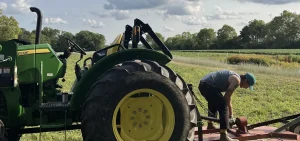News
Why the bipartisan Farm Bill is getting tangled in divisive political debates
By: Shay Frank | WYSO
Posted on:
YELLOW SPRINGS, Ohio (WYSO) — Unlike much of the legislation in Congress, the Farm Bill has historically received bipartisan support. But recently versions have become tangled in political debates.
The Farm Bill got its start in the 1930s. It was meant to reduce agricultural surplus and raise crop prices in the wake of the Great Depression and the Dust Bowl. The massive legislation package now covers a wide range of agriculture issues, from grocery help for poor families to crop subsidies.
But this one is nearly a year behind schedule.
It expired in 2023, and its temporary extension expires Sept. 30.
Historically, the bill has been reauthorized without much controversy every five years, but the last three reauthorizations have faced delays.
“We usually pass a farm bill every five years, this year it’s been a problem,” said Ohio Democratic Sen. Sherrod Brown, a long-time member of the Agriculture Committee.
Experts say the delay is a sign of a broader shift in how Farm Bills are evolving.

Hunger help is in the crossfire
Republican lawmakers are looking at cutting $30 billion from SNAP benefits, and to move funds to agriculture commodities and crop insurance.
SNAP benefits, formerly known as food stamps, help low-income people pay for food and groceries. Typically three-quarters of the Farm Bill money goes to nutrition needs and the rest is divided across other agriculture-based categories.
Ironically, that sort of move could hurt smaller farmers, said Farm Manager for Patchwork Gardens, Larissa Duprey, who owns the 12-acre farm in Yellow Springs.
“As farmers and local, small-scale farmers, if you want people to be able to afford your produce, and be able to support your business, then they’re going to need those SNAP benefits at the market that we help run,” she said.
SNAP is not only important to small farmers. The Farm Bill is also a critical part of food security, said Jack Irvin, a public policy expert with the Ohio Farm Bureau.
“Having that safety net provides a lot of long term stability for our country to have food security, to have nutrition security,” he said. “And fundamentally, that is kind of one of the foundations for national security as a country.”
But Republicans in favor of the SNAP cuts argue those funds should be shifted because farmers are struggling to compete with overseas producers and need more support.
In June, Arkansas Republican Sen. John Boozman addressed the Senate to discuss how they want to put “more farm in the Farm Bill.”
“It means we direct additional resources to the tools that farmers rely on and they are calling for us to invest in, while ensuring we do no harm to our nutrition programs, which account for over 80% of the bill’s baseline spending,” he said.
There is a tough landscape for farmers
The Republican House proposal would allow farmers to sell crops like peanuts, cotton and rice with a bigger safety net for fluctuating market prices.
They’d do this by giving a 10 to 20% bump to a program that offers farmers payments that cover the difference between the price of the commodities guaranteed in the Farm Bill and the product’s actual market price.
Boozman said the agricultural landscape is a lot different than it was when the Farm Bill was last reauthorized and the bill needs to reflect that. But he believes they’ll find a compromise.
“We’ve proven we can do that in the past. I believe with all my heart that we can do it again by passing a bipartisan farm bill,” he said.
A hope for an alliance in the Farm Bill
Brown expects to see a finalized reauthorization before November’s election.
“There’s no reason we can’t do it before the election,” he said. “Partisan politics shouldn’t get in the way. Whoever you’re for for president shouldn’t matter on getting this bill done.”
Irvin said while it may not be top of voters’ minds, the fight over the farm bill is at the core of American life: the food we eat and how we access it.
He is also optimistic that legislators can come to a compromise. But, the election adds to the uncertainty, a year after the bill expired.
“It’s certainly made it a little bit more difficult to move forward with a pretty large and complex bill, like a farm bill, before some of those unknowns maybe get answered,” he said. “In terms of which party is in control of the U.S. House, which party is in control of the U.S. Senate? And, of course, who’s going to be our next president?”

